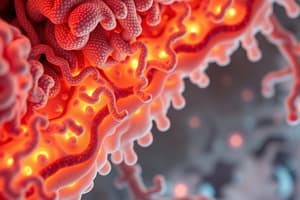Podcast
Questions and Answers
What is the primary function of the rough endoplasmic reticulum?
What is the primary function of the rough endoplasmic reticulum?
- Detoxify alcohol
- Synthesize lipids
- Digest food particles
- Modify, fold, and sort proteins (correct)
How do mitochondria compare in active and inactive cells?
How do mitochondria compare in active and inactive cells?
- Inactive cells have more mitochondria than active cells
- All cells have a uniform number of mitochondria
- Active cells have more mitochondria than inactive cells (correct)
- Active cells have less mitochondria than inactive cells
What is true about lysosomes?
What is true about lysosomes?
- They contain digestive enzymes for breaking down wastes (correct)
- They are involved in detoxifying alcohol
- They are responsible for synthesizing lipids
- They capture free radicals
What distinguishes smooth endoplasmic reticulum from rough endoplasmic reticulum?
What distinguishes smooth endoplasmic reticulum from rough endoplasmic reticulum?
Which organelle serves as the cell's distribution center for proteins?
Which organelle serves as the cell's distribution center for proteins?
What function do peroxisomes perform in the cell?
What function do peroxisomes perform in the cell?
What characteristic do mitochondria possess that distinguishes them from other organelles?
What characteristic do mitochondria possess that distinguishes them from other organelles?
What structural feature is specific to the inner membrane of mitochondria?
What structural feature is specific to the inner membrane of mitochondria?
What is the primary function of rough endoplasmic reticulum (Rough ER)?
What is the primary function of rough endoplasmic reticulum (Rough ER)?
Which structure is responsible for converting energy from nutrients into ATP?
Which structure is responsible for converting energy from nutrients into ATP?
What role do vesicles play in cellular function?
What role do vesicles play in cellular function?
Which type of tissue is primarily involved in transmitting and integrating information?
Which type of tissue is primarily involved in transmitting and integrating information?
What is the main function of lysosomes within the cell?
What is the main function of lysosomes within the cell?
What distinguishes smooth endoplasmic reticulum from rough endoplasmic reticulum?
What distinguishes smooth endoplasmic reticulum from rough endoplasmic reticulum?
What is the function of the Golgi apparatus?
What is the function of the Golgi apparatus?
Which organelle is specifically involved in breaking down harmful substances?
Which organelle is specifically involved in breaking down harmful substances?
Flashcards are hidden until you start studying
Study Notes
Cell Organelles
- The endoplasmic reticulum (ER) is a network of membranes within the cytoplasm.
- Rough ER is coated with ribosomes and is involved in protein modification, folding, and sorting.
- Smooth ER synthesizes lipids and breaks down nutrients and toxins.
- Ribosomes are small bodies found in the cytoplasm or attached to the ER.
- Composed of RNA and protein, they manufacture proteins.
- The Golgi apparatus is a series of layered membranes that further modifies proteins.
- It sorts and prepares proteins for transport to other parts of the cell or out of the cell.
- Mitochondria are large organelles with internal folded membranes.
- They convert energy from nutrients into ATP.
- Cells with high energy demands, like liver and kidney cells, have more mitochondria than cells with low energy demands, like bone and tendon cells.
- Mitochondria have their own DNA. Their structure resembles elongated bacteria.
- Composed of an outer smooth membrane and an inner membrane with folds called cristae.
- The fluid inside the inner membrane is called the matrix and contains ribosomes, DNA, and enzymes.
- Lysosomes are small sacs of digestive enzymes that rid the body of worn-out parts.
- Peroxisomes are membrane-enclosed organelles containing enzymes.
- They break down harmful substances like alcohol and other cellular toxins.
- They target free radicals.
- Proteasomes are barrel-shaped structures composed of protein.
- They capture and degrade proteins that are no longer required by the cell.
- Vesicles are small membrane-bound sacs in the cytoplasm.
- They store materials and move materials into or out of the cell in bulk.
- Centrioles are rod-shaped bodies (usually two) near the nucleus.
- They help separate the chromosomes during cell division.
Tissues of the Body
- There are four basic tissue types: epithelial tissue, connective tissue, muscle tissue, and nervous tissue.
- Epithelial tissue forms protective boundaries and is involved in the diffusion of ions and molecules.
- Connective tissue underlies and supports other tissue types.
- Muscle tissue contracts to initiate movement in the body.
- Nervous tissue transmits and integrates information through the central and peripheral nervous systems.
Studying That Suits You
Use AI to generate personalized quizzes and flashcards to suit your learning preferences.




